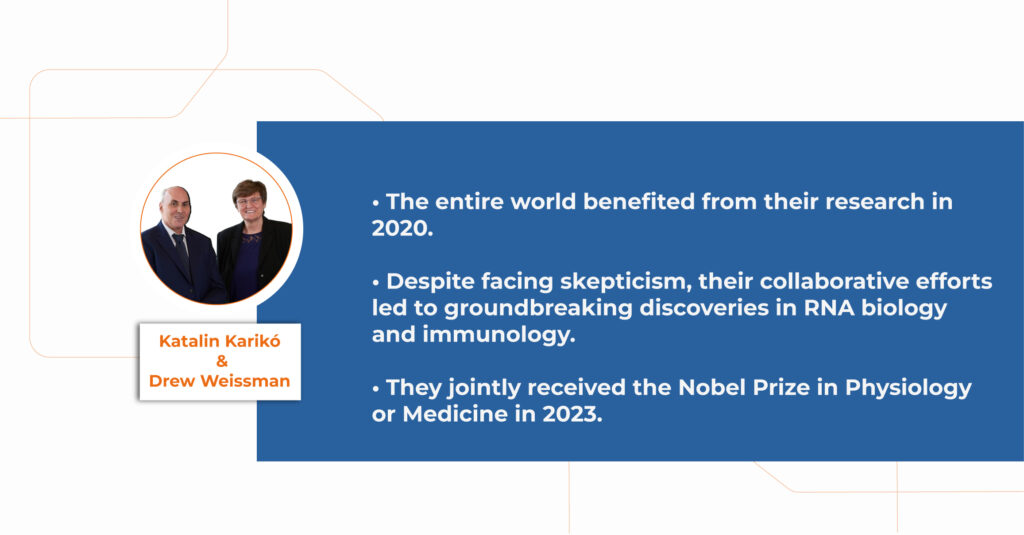Pioneers of RNA Medicine: The Collaborative Journey of Katalin Karikó and Drew Weissman
- The entire world benefited from their research in 2020.
- Despite facing skepticism, their collaborative efforts led to groundbreaking discoveries in RNA biology and immunology.
- They jointly received the Nobel Prize in Physiology or Medicine in 2023.

In the field of modern medicine, Katalin Karikó and Drew Weissman are recognized for their significant contributions to groundbreaking innovation, specifically within the areas of RNA biology and immunology.
Their collaborative efforts paved the way for revolutionary advancements in therapeutics, most notably the development of mRNA-based vaccines.
Katalin Karikó
Born and raised in Hungary, Katalin Karikó’s aspired to be a scientist and was determined to achieve that goal. After obtaining her Ph.D. from the University of Szeged, she served as a postdoctoral fellow at its Biological Research Center where she laid the foundation for her career. Despite facing numerous challenges, including financial constraints and academic setbacks, Karikó persevered, fueled by an unyielding determination to make a difference in molecular biology. Her relentless pursuit of understanding RNA’s mechanisms set her apart; despite skepticism, Karikó persevered, driven by a belief in RNA-based therapies’ transformative potential.
Karikó emigrated to the United States in the 1980s, joining the University of Pennsylvania. In 2005, alongside Drew Weissman, they developed a method making mRNA more acceptable to the immune system, paving the way for vaccines. BioNTech hired her in 2013, where she contributed to groundbreaking research on lipid nanoparticles. Karikó’s journey reflects her unwavering dedication, challenging stereotypes and contributing to transformative medical advancements.
Drew Weissman
Drew Weissman, born in 1959 in Lexington, Massachusetts, is a leading figure in immunology. After earning his doctorate from Boston University in 1987, he primarily worked at the University of Pennsylvania. His groundbreaking research on the AIDS virus, alongside Anthony Fauci, and his collaboration with Katalin Karikó in harnessing mRNA for vaccines have had a profound impact on medicine. Weissman’s commitment to research and its potential life-saving implications continues to drive his pursuit of innovative solutions in disease prevention. Delighted by the prospect that his work on RNA may have contributed to saving millions of lives, he remains resolute in his endeavors; one of his current objectives includes developing a vaccine for all coronaviruses.
A Symbiotic Partnership That Revolutionized Medicine
Katalin Karikó and Drew Weissman met at the University of Pennsylvania in 1998. Katalin Karikó was deeply convinced of the potential of messenger RNA and persuaded Drew Weissman to join her work. In 2005, they published promising initial results, but it would take another 15 years – and the emergence of the devastating SARS-CoV-2 virus – before the global scientific community finally understood the importance of their discoveries.
Amidst the rigors of scientific inquiry, Karikó and Weissman’s partnership was not devoid of lighthearted moments. Rumor has it that amidst late-night experiments, Weissman would regale Karikó with his eclectic taste in music, ranging from classical symphonies to obscure indie rock bands. These lighthearted moments provided a welcome respite from the intensity of their research endeavors.
mRNA Vaccines: A Brief Explainer
Vaccines work by triggering the body’s immune system to create defenses against pathogens. mRNA vaccines are a specific type of vaccine that uses mRNA which transfers genetic information from DNA to prompt protein production. Katalin Karikó and Drew Weissman found that specific modifications to RNA building blocks could prevent unwanted inflammation and enhance desired protein production. This breakthrough paved the way for the development of effective mRNA vaccines against COVID-19.
Legacy and Future Horizons
Karikó and Weissman have been acknowledged with numerous national and international commendations. In 2023, they were given the Nobel Prize in Physiology or Medicine for their groundbreaking research on nucleoside base modifications. Their work paved the way for the development of highly effective mRNA vaccines against COVID-19. Despite facing rejection from prestigious journals like Nature and Science in 2005, their persistence led to this remarkable achievement. The journey towards mRNA vaccines faced numerous challenges over the years, including funding shortages, concerns regarding the technology’s safety, and skepticism among scientists. Karikó and Weissman’s study, initially perceived as complex and challenging to grasp, proved instrumental in addressing the COVID-19 pandemic. The success of mRNA vaccines in preventing severe illness, hospitalization, and fatalities underscores the critical importance of this technology.
Recommended Sources for Digging Deeper
- University of Szeged. Curriculum Vitae: Katalin Karikó.
- Riley, J. (2020). “Katalin Karikó.” Time Magazine.
- Stanford University School of Medicine. Drew Weissman, MD, Ph.D.
- Weissman D, Karikó K. mRNA: Fulfilling the Promise of Gene Therapy. Mol Ther. 2015 Sep;23(9):1416-7. doi: 10.1038/mt.2015.138. PMID: 26321183; PMCID: PMC4817894.
- Bansal A. From rejection to the Nobel Prize: Karikó and Weissman’s pioneering work on mRNA vaccines, and the need for diversity and inclusion in translational immunology. Front Immunol. 2023 Nov 8;14:1306025. doi: 10.3389/fimmu.2023.1306025. PMID: 38022662; PMCID: PMC10663363.

